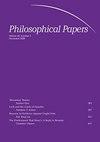世界公民和他们的宗教
IF 1.3
3区 哲学
0 PHILOSOPHY
引用次数: 0
摘要
摘要“世界主义”的概念与其哲学起源大相径庭,但最终可能起到类似的作用。全球和平或任何形式的全球管理的希望在联邦或自治社区的复杂网络中可能比在全球帝国中更好地实现。不管有没有这样一个帝国,我们都需要一些广泛共享的“士气”或“宗教”,以维持合作和服从共同利益。有许多这样相互竞争的“宗教”和乌托邦理想,以至于表面上不同但又惊人相似的权力块(正如奥威尔所描述的)之间正在进行的全球战争似乎不可避免。一个更有希望的未来将是一个资产阶级价值观、对其他地球生命的新尊重以及对宇宙浩瀚和陌生的认识为我们在地球上或恒星之间的合作提供了背景的未来。在这样的未来,贸易和运输规则可能掌握在像吉卜林的空中控制委员会这样的机构手中,该委员会由一种新的国际化组织组成,偶尔会受到民众的指责。这样的命令是否能避免分裂,肯定还是个疑问。本文章由计算机程序翻译,如有差异,请以英文原文为准。
Citizens of the World and their Religion
Abstract The notion of a ‘cosmopolites’ has diverged quite far from its philosophical origins, but may eventually serve a similar function. The hope of a global peace or any sort of global management is probably better fulfilled in a federation or complex network of self-governing communities than in a global empire. With or without such an empire though we need some widely shared ‘morale’ or ‘religion’ that will sustain cooperation and obedience to the common good. There are many such competing ‘religions’ and utopian ideals, such that an ongoing global war between superficially distinct but also alarmingly similar power blocks (as described by Orwell) may seem inevitable. A more hopeful future would be one where bourgeois values, a new respect for other terrestrial life, and an awareness of the vastness and strangeness of the cosmos provide a backdrop for such cooperation, on Earth or out among the stars, as we can manage. The rules of trade and transport in such a future may be in the hands of something like Kipling’s Aerial Board of Control, staffed by a new sort of cosmopolitan, subject to occasional popular rebuke. Whether such an order would avoid division must be doubtful still.
求助全文
通过发布文献求助,成功后即可免费获取论文全文。
去求助
来源期刊

Philosophical Papers
PHILOSOPHY-
CiteScore
2.10
自引率
0.00%
发文量
18
期刊介绍:
Philosophical Papers is an international, generalist journal of philosophy edited in South Africa Original Articles: Articles appearing in regular issues are original, high-quality, and stand-alone, and are written for the general professional philosopher. Submissions are welcome in any area of philosophy and undergo a process of peer review based on initial editor screening and refereeing by (usually) two referees. Special Issues: Topic-based special issues are comprised of both invited and submitted papers selected by guest editors. Recent special issues have included ''Philosophy''s Therapeutic Potential'' (2014, editor Dylan Futter); ''Aging and the Elderly'' (2012, editors Tom Martin and Samantha Vice); ''The Problem of the Criterion'' (2011, editor Mark Nelson); ''Retributive Emotions'' (2010, editor Lucy Allais); ‘Rape and its Meaning/s’ (2009, editor Louise du Toit). Calls for papers for upcoming special issues can be found here. Ideas for future special issues are welcome.
 求助内容:
求助内容: 应助结果提醒方式:
应助结果提醒方式:


